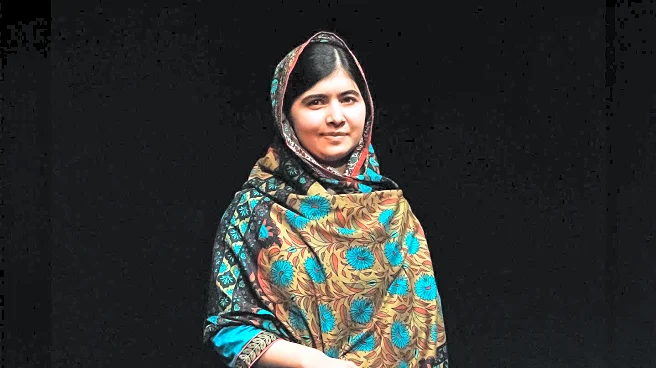What's Happening?
Malala Yousafzai, Nobel Peace Prize laureate, is reintroducing herself through her new memoir, 'Finding My Way'. In an interview, Yousafzai discusses her growth over the past decade, focusing on her experiences
with friendships, marriage, mental health, and activism. The memoir details her journey from surviving a Taliban attack in 2012 to her life in the UK, where she pursued education at Oxford University. Yousafzai shares her struggles with cultural adaptation and mental health, including panic attacks and flashbacks. Her story emphasizes the importance of therapy and finding love, as she recounts her marriage to Asser Malik.
Why It's Important?
Yousafzai's memoir offers a deeper understanding of her personal experiences beyond her public activism, highlighting the challenges faced by survivors of violence. Her openness about mental health issues contributes to destigmatizing therapy and encourages others to seek help. The memoir also sheds light on the cultural barriers faced by immigrants, providing insights into the complexities of adapting to new environments. Yousafzai's story serves as an inspiration for young women and advocates for education and empowerment, reinforcing her role as a global symbol of resilience and courage.
What's Next?
The release of 'Finding My Way' is expected to spark discussions on mental health, cultural adaptation, and women's rights. Yousafzai's insights may influence public policy and educational initiatives aimed at supporting survivors of violence and promoting mental health awareness. Her continued advocacy work is likely to focus on expanding access to education for girls worldwide. Readers and activists may engage in dialogues about the memoir's themes, potentially leading to collaborative efforts to address the issues highlighted in her story.
Beyond the Headlines
Yousafzai's memoir underscores the ethical considerations of storytelling and representation, particularly in the context of trauma and recovery. Her narrative challenges traditional perceptions of marriage and partnership, advocating for relationships based on equality and shared values. The memoir may also contribute to broader cultural shifts in how society views mental health and therapy, encouraging more open conversations about these topics.











